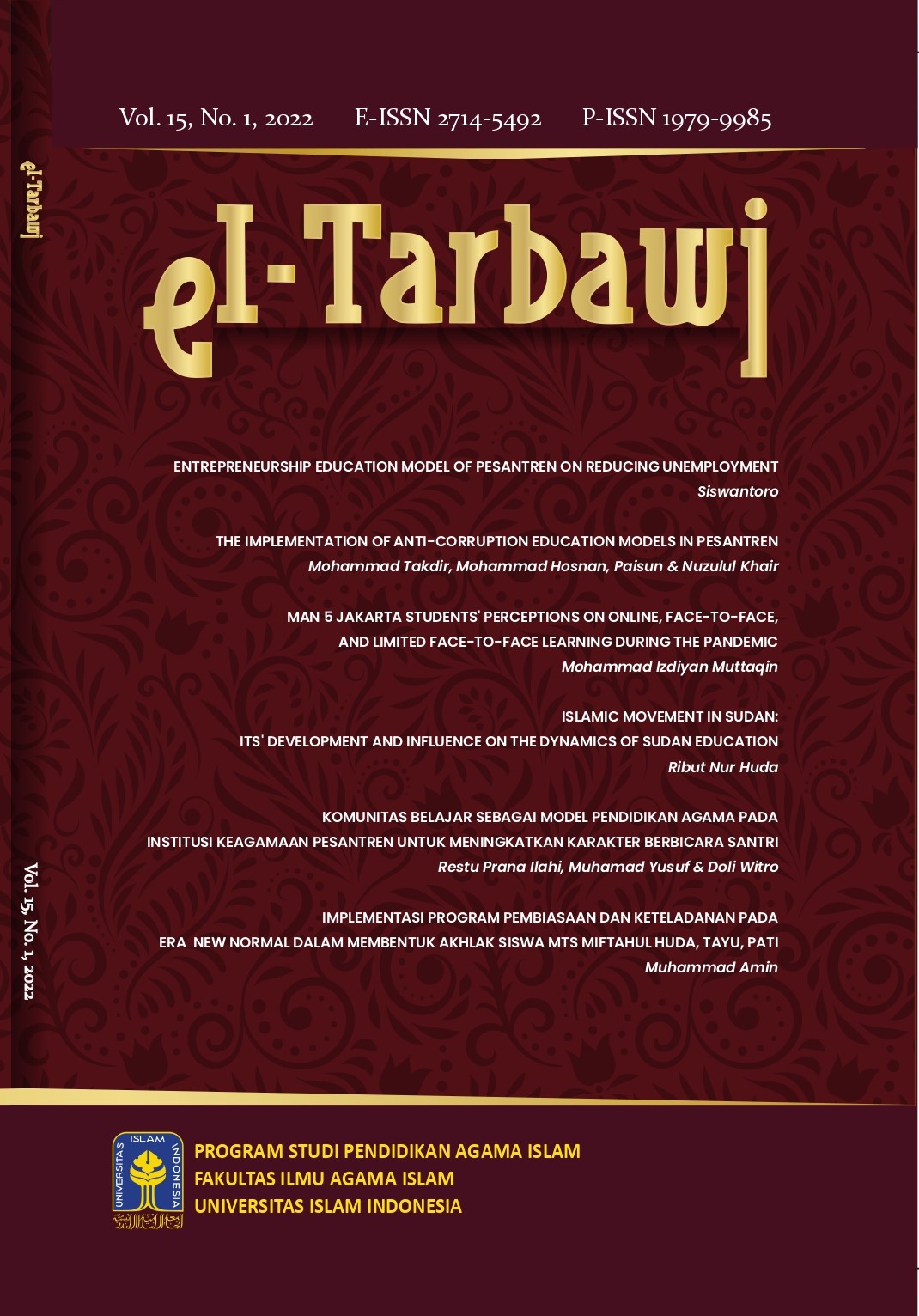Main Article Content
Abstract
The Islamic movement has occupied an important place in Sudan's educational world from its leadership in 1989 till the present. The role of the Islamic Movement seems imbalanced and causes influential people "go their separate ways". In addition to subordination, the Islamic Movement restricts academics' and intellectuals' space to speak the truth and connect people's aspirations. This study is noteworthy in light of the Sudan situation, which has seen the loss of many of its best academicians and the absence of freedom and resources for teaching, research, and publication. This study concludes that the Islamic Movement, which has been in power for more than 30 years, has influenced the decline of scientists' careers in the country and their immigration to other countries to keep working after retirement. This study determines the extent of the political influence of the Islamic Movement on the dynamics of the academic realms. This study also explores the truth of the assumptions of the Sudanese people that “the Sudanese government failed, but the people succeeded” by conducting historical and phenomenological analysis associated with the Islamic Movement as an organizational entity as well as a practical political force.
Keywords
Article Details
Copyright (c) 2022 Ribut Nur Huda

This work is licensed under a Creative Commons Attribution-ShareAlike 4.0 International License.
Authors retain copyright and grant the journal right of first publication with the work simultaneously licensed under a Creative Commons Attribution (CC-BY-SA) 4.0 License that allows others to share the work with an acknowledgment of the work’s authorship and initial publication in this journal.
References
- Abidin, A. M. (2019). Tarikh as-Tsaqofah al-Arabiyah Fi as-Sudan. Dar al-Mushawarat.
- Abusy, M. A. (2018). Ma Ba’da Istiqlal al-Sudan, Aina Yakmunu al-Kholal? Madarik.
- Ali, M. T., & Hammud, A. (2022). Ahdaaf wa Mahaam al-Ta’lim al-‘Ali. Persatuan Pelajar Putri Indonesia Sudan dan Kementerian Pendidikan Tinggi Sudan.
- Bakri. (2018). Rais Majma Lughah al-Arabiyah Bakri al-Haj fi Awwal Hiwaar. https://alintibaha.net
- Hoktaviandri. (2019). Pendidikan Islam di Sudan. Al Kahfi: Jurnal Pendidikan Agama Islam, 4(2).
- Husein, A. (2016). Tarikh Sudan. Dar al-Hayat Lin Nashr wa al-Tauzi’.
- Khashogi, L. R. (2019). Dialektika Tradisi Keilmuan dalam Islam: Pengalaman Inteligensia Muslim Mesir. Politea : Jurnal Politik Islam, 2(2), 131–149. https://doi.org/10.20414/politea.v2i2.1570
- Mohammed, A. R. (2012). Daur al-Masyru’aat al-Mumawwalah min Diwan al-Zakat fi al-Takhfif min Wath’at al-Faqr fi al-Sudan. Tafakkur, 12(2), Article 2. http://journals.uofg.edu.sd/index.php/tfkr/article/view/686
- Mohammed, K. H. (2015). Nadzaraat fii al-Azmah al-Sudaniyah: al-Hiwaar al-Wathani wa Maalaatihi. Sudan Centre For Research & Strategic Studies.
- Nasution, H. B. (2017). Ikhwanul Muslimin and the Future of Islamic Movement. 9. https://doi.org/10.9790/0837-2211056775
- Wahiduddin. (2020). Konflik Sudan dan Jatuhnya Rezim Omar Bashir | Nady Al-Adab: Jurnal Bahasa Arab. https://journal.unhas.ac.id/index.php/naa/article/view/10086
- Wahyudi, N., Basyar, M. H., Mashad, D., & Ghafur, M. F. (2016). Problematika Kekuatan Politik Islam di Maroko, Sudan, dan Somalia. Jurnal Penelitian Politik, 13(2), 245–260. https://doi.org/10.14203/jpp.v13i2.564
References
Abidin, A. M. (2019). Tarikh as-Tsaqofah al-Arabiyah Fi as-Sudan. Dar al-Mushawarat.
Abusy, M. A. (2018). Ma Ba’da Istiqlal al-Sudan, Aina Yakmunu al-Kholal? Madarik.
Ali, M. T., & Hammud, A. (2022). Ahdaaf wa Mahaam al-Ta’lim al-‘Ali. Persatuan Pelajar Putri Indonesia Sudan dan Kementerian Pendidikan Tinggi Sudan.
Bakri. (2018). Rais Majma Lughah al-Arabiyah Bakri al-Haj fi Awwal Hiwaar. https://alintibaha.net
Hoktaviandri. (2019). Pendidikan Islam di Sudan. Al Kahfi: Jurnal Pendidikan Agama Islam, 4(2).
Husein, A. (2016). Tarikh Sudan. Dar al-Hayat Lin Nashr wa al-Tauzi’.
Khashogi, L. R. (2019). Dialektika Tradisi Keilmuan dalam Islam: Pengalaman Inteligensia Muslim Mesir. Politea : Jurnal Politik Islam, 2(2), 131–149. https://doi.org/10.20414/politea.v2i2.1570
Mohammed, A. R. (2012). Daur al-Masyru’aat al-Mumawwalah min Diwan al-Zakat fi al-Takhfif min Wath’at al-Faqr fi al-Sudan. Tafakkur, 12(2), Article 2. http://journals.uofg.edu.sd/index.php/tfkr/article/view/686
Mohammed, K. H. (2015). Nadzaraat fii al-Azmah al-Sudaniyah: al-Hiwaar al-Wathani wa Maalaatihi. Sudan Centre For Research & Strategic Studies.
Nasution, H. B. (2017). Ikhwanul Muslimin and the Future of Islamic Movement. 9. https://doi.org/10.9790/0837-2211056775
Wahiduddin. (2020). Konflik Sudan dan Jatuhnya Rezim Omar Bashir | Nady Al-Adab: Jurnal Bahasa Arab. https://journal.unhas.ac.id/index.php/naa/article/view/10086
Wahyudi, N., Basyar, M. H., Mashad, D., & Ghafur, M. F. (2016). Problematika Kekuatan Politik Islam di Maroko, Sudan, dan Somalia. Jurnal Penelitian Politik, 13(2), 245–260. https://doi.org/10.14203/jpp.v13i2.564
